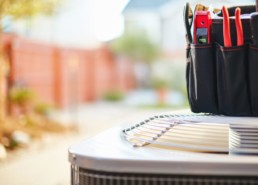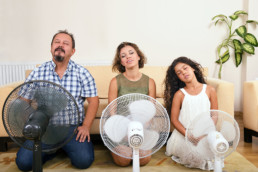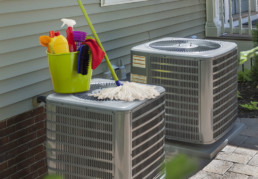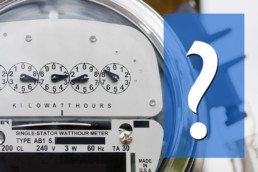Cold In Florida? Better Check These Things Before Turning On Your Heater!
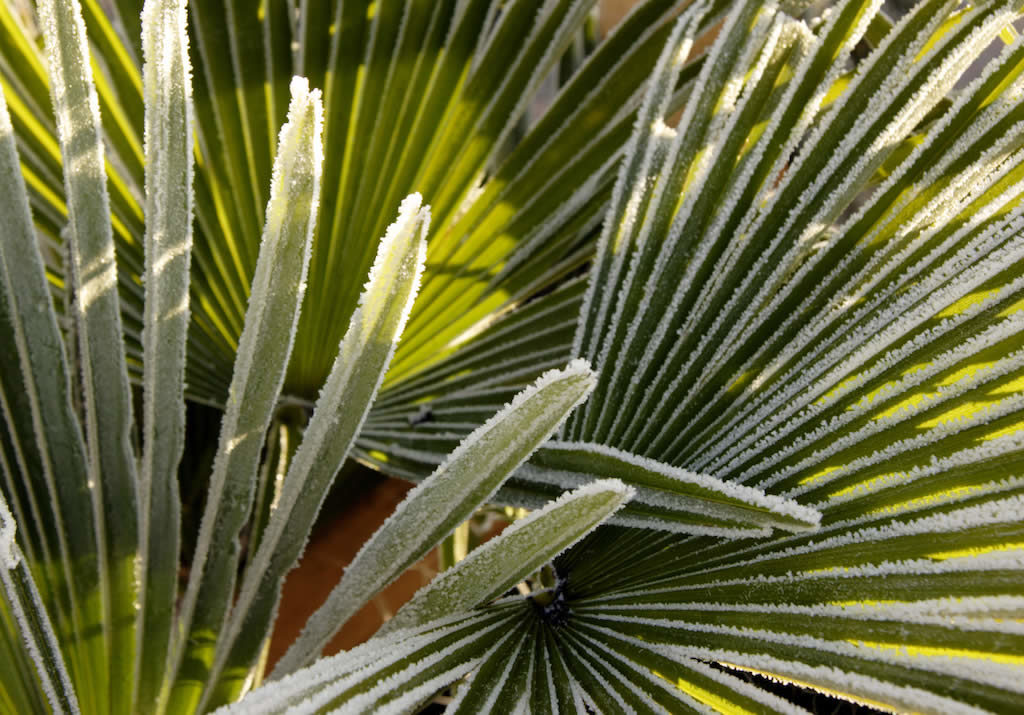
In a hot state like Florida, some of us get excited about cranking up the heater we don’t get to use very often. However, it’s wise to hold off until you’ve made sure that your unit is clean, safe and optimally efficient. This will not only extend its life, but it will save you money, protect the environment and keep you warmer.
When it’s cold outside, a running heater in Florida is just as important as a running heater in Wisconsin. Regular maintenance by your HVAC company is a must, but there are some do-it-yourself steps you can take to get the most out of your equipment.
Check Air Supply Vents
Warm air enters your rooms through air supply vents, so they need to be thoroughly dusted or vacuumed. This is especially true of floor vents that collect dust, debris and pet hair.
Check Air Filters
Depending on the type of system you have, the air filters on the return grills should be changed either every one to three months or every six to 12 months. You may even have washable air filters.
Whatever kind you have, they shouldn’t look dark or have dust and lint clinging to them. Check to see if they need washing or replacing, especially if you know deep down in your heart that it’s been a while. When you hold them up to a light source, plenty of light should shine through.
Not only do filters keep your furnace or air handler heater clean for better performance, but they filter out dust, bacteria, and allergens before those pollutants wind up in your lungs. Everyone agrees that poor air quality in the home is a health risk. Clean filters also eliminate that unpleasant odor of burning dust.
Clean Around the Unit
Clean the entire area around the heat pump, furnace or air handler heater. Clear any obstructions. It goes without saying that chemicals and flammable materials in the vicinity need to be relocated a safe distance away. Dust the exterior of the unit.
Trim back trees or shrubs to prevent contact with heat pump outdoor units, and inspect the condenser coil. That’s the looping length of copper or aluminum that exchanges heat from the air. Excessive dirt will impact efficiency and lead to repairs down the road.
If you have an indoor system, your evaporator coils are internal and are inspected by a technician during routine maintenance.
Play It Safe
For owners of gas furnaces, the importance of having a well-functioning smoke alarm can’t be overstated. It’s time to change the batteries, cover your ears and make sure that the alarm is working properly.
If you don’t have a smoke alarm, get one. Install it today.
Along the same lines, a carbon monoxide detector could save your life. If you have one, replace the batteries. Test it before you turn on the heat.
If the reading on the device exceeds 30, turn off the heater immediately, open all the windows and call your HVAC company. Some experts advise leaving the house until a professional diagnosis and correct the problem.
Finally, make sure that your thermostat is working properly.
Maintaining a running heater in Florida may not be at the top of your priority list, but it’s better to be safe than sorry. The longer a heating system is neglected, the greater the likelihood of malfunctions that call for costly repairs.
Besides, who wants to be caught unawares in a cold snap? Check out our special fall and winter offers and Call or Text us today for more details (941) 203-7955.
Keep Your Air Conditioning Bills Down By Shading Your Air Conditioner
If you want to save money on your air-conditioning bill but don't know where you should start, you could be wondering what steps will help you reach your goal. Most people don't realize the location and condition of their outdoor unit plays a role in how much they pay for energy each month.
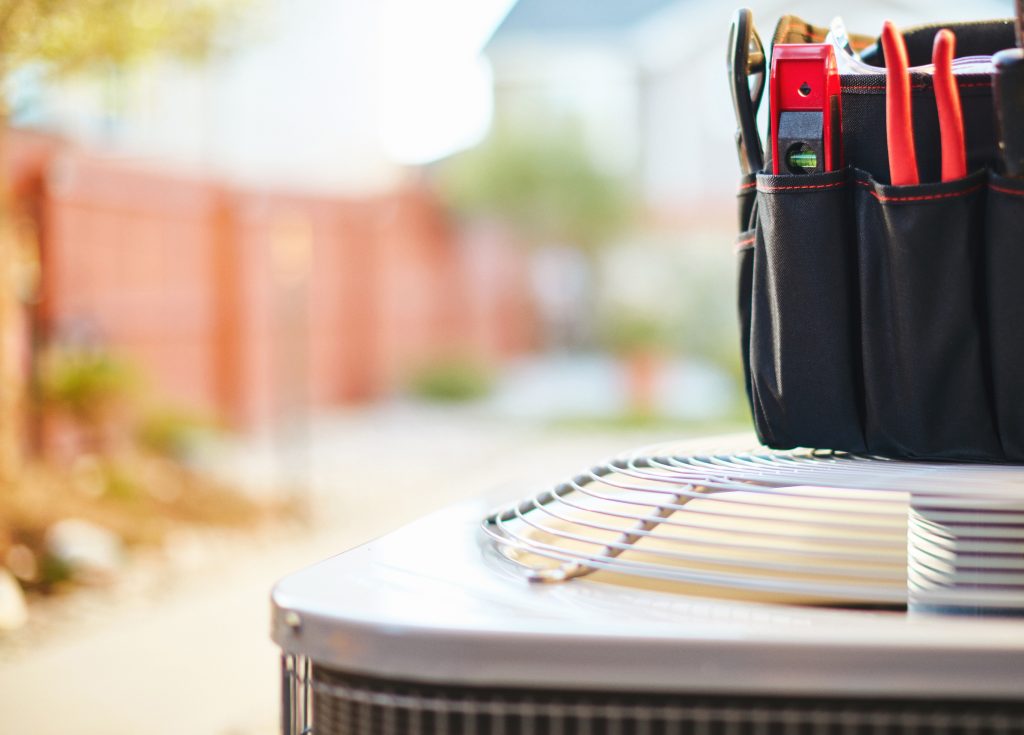
Shading your unit from the sun's hot summer rays is a great way to keep more money in your pocket. You will learn why shading your air-conditioning system makes a difference and get a few ideas on how to move forward.
Why Cooling Your Outdoor Unit Matters
Take a look at how your air-conditioning unit works when you want an idea of how shading it can help you save money. In simple terms, your unit sucks in air from the environment and cools it before blowing the air into your home. Allowing your unit to heat up forces it to work much harder to do its job properly, and your bill will go up as a result. Keeping your air-conditioning unit cool reduces the amount of work required to cool your home. The savings will then speak for themselves.
Plant Trees and Shrubs
Planting trees and shrubs around your yard is a great way to protect your air conditioning system from the hot sun during the summer months. You can get the best possible results by choosing trees that match the look and style of your home and environment. Consider how big the trees will grow so that you don't plant them in a dangerous spot. Planting trees in your yard can also shade your windows from the sun, and you will take your savings to a whole new level.
Install an Awning
Not everyone wants to plant trees in their yard, and some are even unable to do so for a range of reasons. No matter the reason, you can opt to install an awning over your unit to keep it as cool as possible when the temperature peaks. Choose between a standard and retractable awning depending on your needs and goals. Since they leave the awning in place more often than not, most people use a standard awning.
You don't want to buy an awning and find that it won’t fit in your yard. Before you spend any money, measure the amount of space you have around your air-conditioning unit. Also, pay attention to the sun to discover the angle from which it hits your unit most of the time.
Place a Tent Around Your Unit
If you don't want to spend money on trees or an awning, you are not out of options yet. You can go to the store and buy a tent to place around your air-conditioning unit when your goal is to reduce your energy bill. Don't make a final decision until you know what size is right for your situation, and you won't face unneeded complications along the way. If you live in an area with heavy rain or wind, stabilize your tent to prevent it from blowing away or falling apart when you least expect it.
Consider Moving Your Unit
You might not have any viable options when it comes to shading your air conditioner from the sun, but you don't need to give up yet. You can move it when everything else fails to do the trick. People sometimes want to move their unit without getting help from an expert, but you don't want to follow in their footsteps. Unless you are a trained professional, you could make critical mistakes and damage something without realizing what has happened. Always contact a team of experts when you need to relocate.
Final Thoughts
Shading your air conditioner is a great way to protect yourself from unreasonable energy bills over the summer. You might think doing so won't make much of a difference over the long run, but you must try it for yourself to see the impact it can have. To get an accurate number, compare your energy bill after you make the change to before you installed the shade. Those who have already done so report an average savings of $200 per year. The steps you take to save money matter and add up over the years, and you will be thrilled when you discover how much you can lower your power bill. For further assistance, call or text us at (941) 203-7955.
How to Make Your Central Air Conditioner More Efficient
If you are like others, you are preparing for the hot and sunny weather of summer. Most people spend a lot of money to keep their homes cool and comfortable, and a lot of them could save tons of money by following a few simple tips.
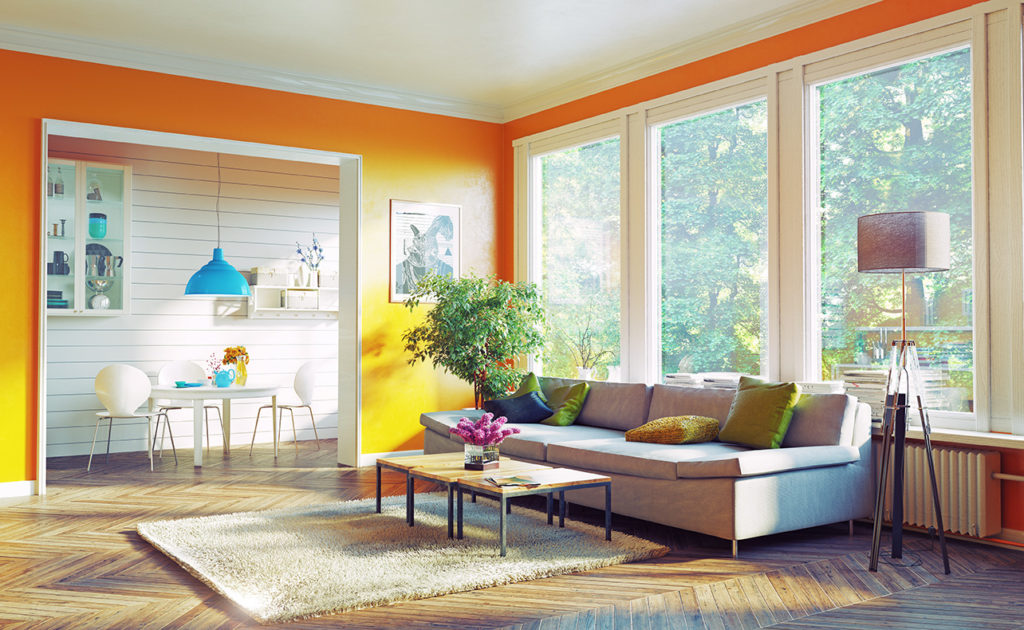
If you want to achieve a cool temperature in your home no matter the weather, properly maintaining your central cooling unit will do wonders for your monthly utility bills. Some of the advice you read might not seem like it will do much, but each step works together to provide you with outstanding results. You will keep the summer heat at bay without breaking your budget in the process, and the outcome will please you.
Clean Your Condenser Unit
Looking at your condenser unit is a good place from which to start when your mission is to control your cooling bill. Located outside your home, the job of the condenser unit is to transfer the hot air from your house to the outside world, but you might have let a lot of time pass since you cleaned it. Dirt and grime that collect on the unit make your air conditioner work much harder to keep your home cool and your energy bill will go up as a result. Before you do anything with your condenser unit, turn the power off so that you don't run into trouble.
Keep Your Indoor Vents Clean and Clear
Most people never think about the condition of the vents in their home, but they are throwing money away without realizing it. Having clean and clear vents is essential if you want your air conditioning unit to work at its best, saving you money over the long run. Ensure that no desks, boxes or other objects are blocking the outside of your vents. Over time, dust builds up inside your vents and reduces the efficiency of your unit. Unscrew all of your vents and look inside them with a flashlight to see how much dirt is present, and you might need to grab a vacuum cleaner to get rid of the mess. This process can take some time to complete, but the money you will save is worth it.
Adjust Your Thermostat
If you have cleaned your vents and condenser unit and are still not happy with your energy consumption, you might think you are out of luck, but you are not. Consider increasing the temperature of your thermostat by a few degrees, and the difference will surprise you. While you won't notice much of a change in the temperature of your home, altering your thermostat by 4 or 5 degrees can lower your energy bill more than you might think. Even if you are feeling skeptical, give it a shot to see if it helps, and you won't be disappointed.
Get a Smart Thermostat
If you are serious about lowering your cooling bill as much as possible, invest in a smart thermostat. These devices let you set a timer to turn your central air on and off depending on when you will be home. For example, you can program it to turn off while you are working and to turn back on before you return. You will always come home to a cool house, but you will also save a lot of money on your energy bill.
Call a Professional
With a little determination and a proven plan, you can go far when it comes to lowering your energy bill during the summer. Although taking steps to maintain your unit is a smart move, it won't always be enough. For the best results, you must contact a team of professionals to inspect your central air unit and make any needed air conditioning repairs. The increased efficiency of your air conditioner will more than pay for the cost of the company you hire, making it an investment with unbeatable returns. Call or Text us today for more details (941) 203-7955.
Get Your Air Conditioner Ready For Florida Summer Temps
As summertime approaches in Florida, homeowners from Sarasota to Venice to Englewood and every city and town in between begin looking for ways to prepare for the increased, humid temperatures. Preparing the air conditioning unit for the weather ahead is the best way to keep energy consumption (and costs) down and maintain comfort throughout the home.
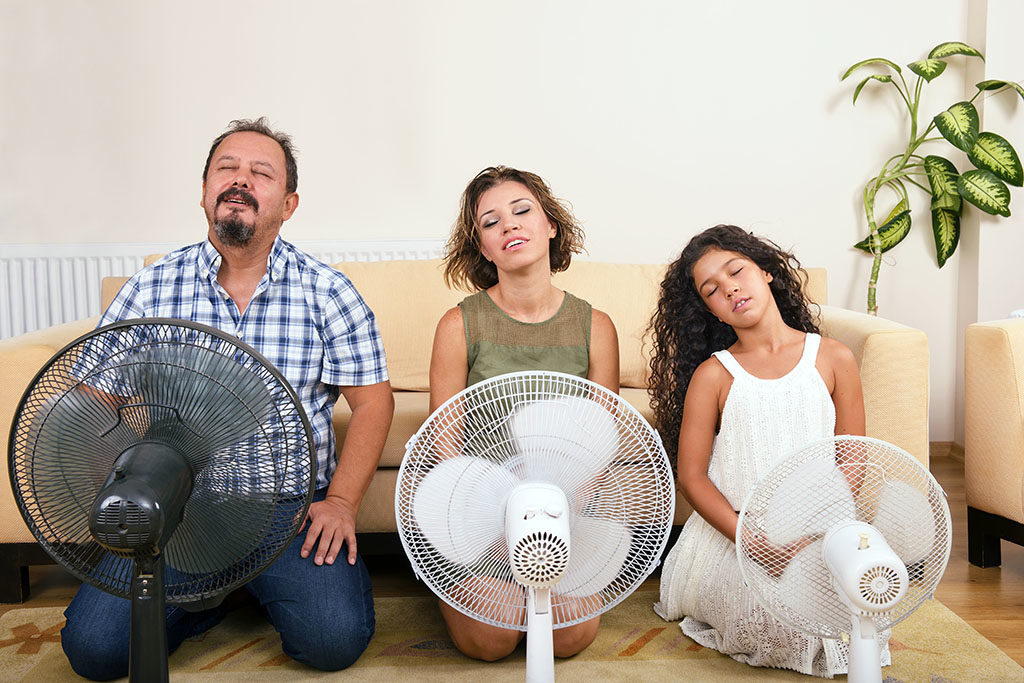
To prepare your air conditioning unit for the summertime weather, first ensure that you understand how the unit works.
Three components make up the A/C unit. This is the condenser, blower unit, and the ductwork. Each of the three components serves an important function in the overall operation of the air conditioning unit.
Ductwork: Metallic, flexible tubes that run through the home are known as the ductwork. The tubes route cold air into the house and remove the hot air. Leaking ductwork is a common problem with this component, though it is safe to say there is a problem if you notice more dust in the home than usual. The leaking ductwork causes an even more serious problem, however, and that is air leakage. Any space between the wall that is leaking is also causing the cooled air to blow between. This causes difficulty cooling the house. Springtime is the perfect time to inspect and/or clean the ductwork to improve AC performance and efficiency.
Condenser: The condenser is the unit sitting outside the home. The refrigerant is added to the condenser, which controls temperatures inside the home. The refrigeration works to absorb heat after the air flows over the evaporator coils. A pressure change causes the refrigerant to turn into a gas that resumes liquefied state when it is cooled again.
Blower Unit: The blower unit helps change the liquid into a gas as the refrigerant enters this space and travels into the coil. This unit draws the warm air into the return ducts while the air conditioning unit pushes the air over the coils into the house to keep it cool. The refrigerant goes back into the condenser and converts back to liquid state after completion of this process.
How to Prepare Your Air Conditioner for Summer
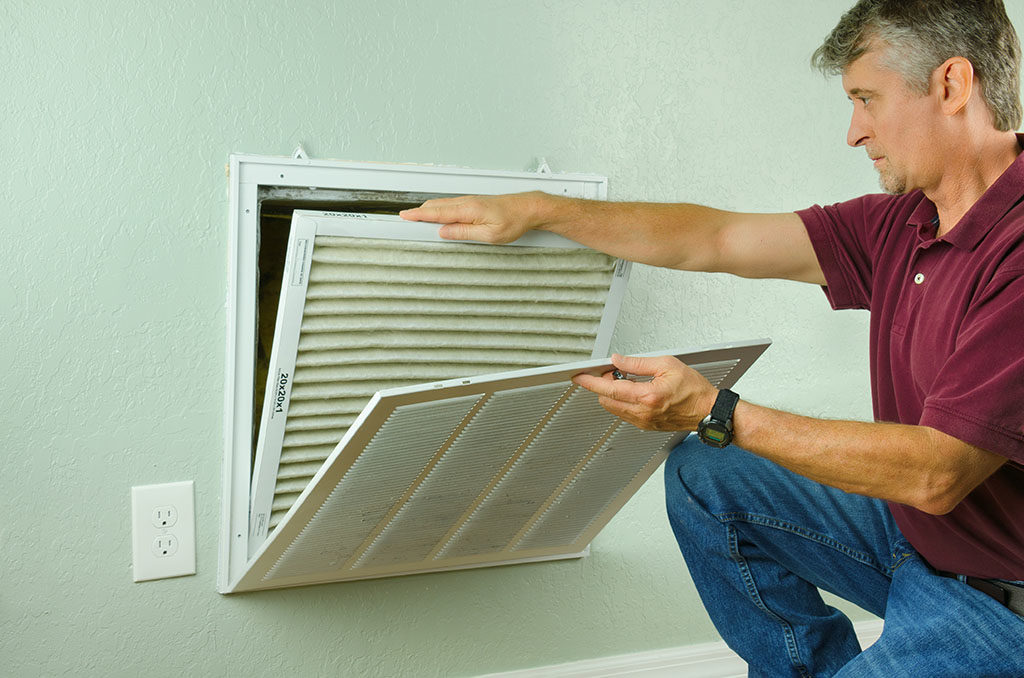 Professional repair serviceman or DIY homeowner removing a dirty air filter on a house air conditioner so he can replace it with a new clean one.
Professional repair serviceman or DIY homeowner removing a dirty air filter on a house air conditioner so he can replace it with a new clean one.
Air Handler Filter Change
Dust, pollen, and other debris are collected inside of the filter. If the filter becomes filled, it performs the opposite job and begins blowing the collected items back outside the unit. The result is decreased comfort, increased energy costs, and an unhealthy environment inside the home. Dirty filters also damage the unit, decreasing its longevity and durability. It is one of the most important components of the A/C unit. Monthly filter changes ensure these issues do not become your own.
Keep the Condenser Unit Free of Debris
Debris and trash can accumulate around the condenser unit outside the home. This causes improper air circulation that damages the A/C unit and its components. Ensure that no debris or trash is allowed around the outdoor unit. Additionally, use these tips to prevent issues with the outdoor unit:
- Use a garden hose to wash the dirt away from the unit
- Trim grass around the unit, keeping it at a short length
- Keep bushes away from the unit
- Do not allow tree branches to overhang on the unit
- Do not place other items on or near the unit
Clean the Condensate Drain
There is a thin piece of PVC pipe situated close to the condenser unit. You'll notice water dripping from this unit. This is normal, though the moisture build-up can attract algae that clog the line; condensation is the result. This may cause water to enter the home, triggering the cooling equipment to shut-off.
It is simple and necessary to clean the drain. Just remove the end of the drain and use a wet/dry vac to remove the slide and water accumulated in the drain. Replace the end when finished.
Check Refrigerant Levels
There are two copper lines running to the condenser unit. Find the larger of the two lines. Sometimes there is insulation around this line. If the line doesn't sweat during A/C cycling or the line is warm after the unit is running, coolant is needed.
Level the Condenser Unit
Check to ensure that the condenser unit is level using a level. Gravel or a small board can help fill any uneven spaces.
A/C Maintenance Inspection
Finally, call a professional A/C repair company Mahle Cool Air & Heat for an annual maintenance inspection. Air conditioning maintenance prolongs the lifetime of the HVAC unit while reducing discomforts and need for repairs. Reduced wear-and-tear is another benefit of this annual inspection. A/C pros thoroughly inspect the unit, looking for signs of damage or breakdown. Those issues are then immediately repaired, reducing headache and hassle. Call or Text us today for more details (941) 203-7955.
Learn the Pros and Cons of Mini-Split Heat Pump HVAC Systems

If you're upgrading your HVAC system or choosing one for a new construction, there are many great heating and cooling products. A mini-split heat pump is a viable option if your home doesn't have ductwork. Learn more about this type of system and how it can efficiently keep you comfortable throughout your home.
Understanding a Mini-Split Heat Pump System
This HVAC installation uses mini-split technology with a heat pump. It's ideal if you already have a ductless system or don't plan to install one. The mini-split is also a great choice when you add a room to your home but extending the ductwork isn't possible.
The system has two main components: an exterior compressor and condenser and an interior air handler in several rooms. It heats spaces by pulling air from outdoors, heating it and releasing it into the rooms. It also cools spaces by pulling warm air out of your house.
Pros of a Mini-Split HVAC System
Mini-split systems offer several advantages to other HVAC equipment, including cost. They're a more affordable option for homes that don't have existing ductwork. Because of their design, they're more energy efficient than central HVAC systems that lose about 30 percent of heated and cooled air in the ducts.
Mini-splits consume less energy too because they maintain zoned temperatures. You can adjust where you need more heating and cooling instead of changing the thermostat for the entire house.
The zoned temperatures also maximize comfort for each person in your home. For example, kids at play indoors might need to turn down the thermostat while you relax in another room that's set for your comfort. The whole family doesn't have to suffer just because one person likes cooler or warmer temperatures.
In addition, there's more flexibility when it comes to installing mini-split systems. They eliminate having to install ducts and only require a small, 3-inch hole in the wall where the handlers connect to the exterior unit. Installers can also hang them on walls, suspend them from the ceiling or mount them into drop ceilings. You can even get floor-standing models.
Cons of a Mini-Split HVAC System
Fortunately, there aren't many disadvantages to choosing a mini-split heat pump for your home. If you already have ductwork, then installing this system may cost more than replacing the central HVAC unit that you have. Although, you might be able to offset the cost with local incentives and rebates.
Installing this HVAC system isn't a do-it-yourself project either. It requires the skill of a trained installer because not placing the exterior and interior units correctly affects how the system functions overall. Having them in the wrong places may reduce the energy efficiency of the whole system. Each air handler also needs to be the correct size for each room to properly control temperature and humidity.
Furthermore, you might not like how the air handlers look inside your home. Vast improvements have been made throughout the years to improve the aesthetics, and many units look quite stylish. However, they're more noticeable than central HVAC vents.
Find Your HVAC System Today
If you need a new heating and cooling system in Venice, Florida, Mahle Inc. Cool Air & Heating offers a complete line of Bryant equipment. Our knowledgeable staff can educate you further about which type of system may work best for your home. Call or Text us today for more details (941) 203-7955.
Save Money This Year With a Clean Central HVAC System
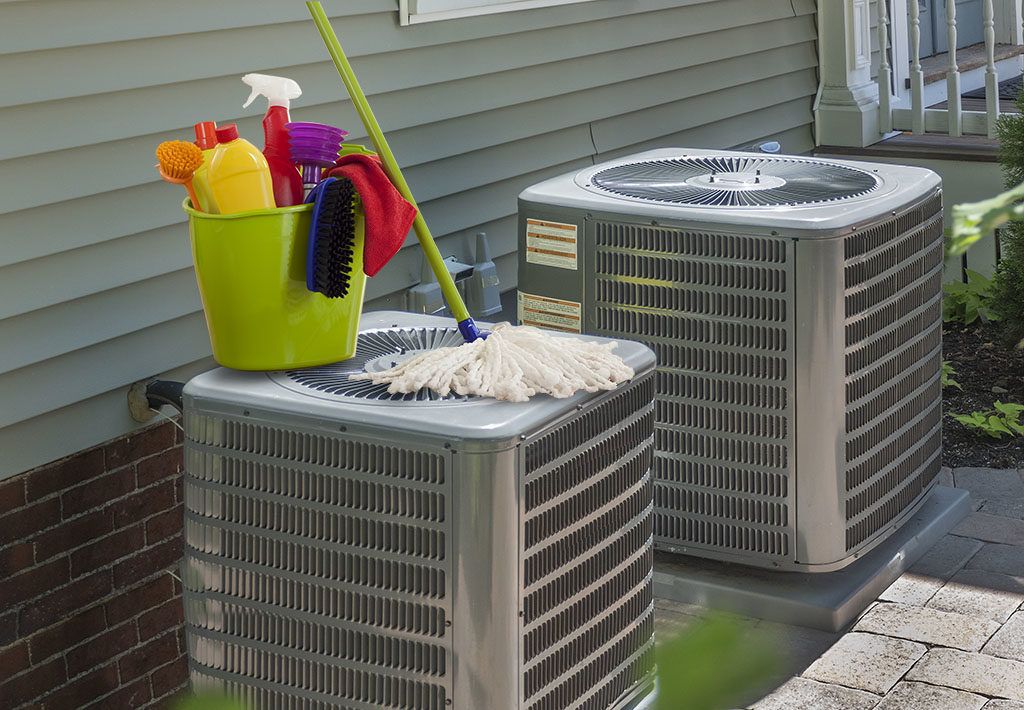
If you are looking for a way to save money throughout the year so that you can safeguard your budget, turning to your heating, ventilating and air conditioning unit is one of the best places to start.
Some people ignore air conditioning maintenance because they want to save time and money, but doing so is expensive when you look at the real cost. A dirty HVAC unit requires more power than normal to operate at its best. When you explore the ways a dirty HVAC unit can cause your energy bill to increase, you will know that taking care of the problem is the smart move.
Dirty Ducts
You might want to take a look at your ventilation system if you have not done so this year. As you run your HVAC unit, dirt can build up and restrict your airflow, forcing your HVAC unit to work much harder, and it will increase your power bill more than you likely suspect as well as expose occupants to allergens, dust particles, and mold.
Dirty Air Handler
Air handler cleaning is another way to decrease your energy bill so that you will have more money to spend on the things you enjoy. Although your filters work hard to protect your HVAC unit, dust and other small particles can still build up if you are not careful. A dirty air handler will put stress on your HVAC unit, and your utility bill can alert you to the problem before you notice the other red flags. Air handler cleaning is always worth the investment when you look at the long run.
Dirty Filters
When air conditioning maintenance is near the top of your mind, you won't want to forget about your filters. The filters in your HVAC unit collect dust, dirt, allergens and other things that will harm the quality of the air in your home. Failing to maintain your filters will enable dirt to build up and block the flow of air. Not only will this problem impact the air you breathe, but it will also affect your energy bill each month. Ensuring that your filters are in good shape is a critical part of the puzzle that will pay for itself in no time.
A Team of Experts on Which You Can Depend
Once you realize that cleaning and maintaining your HVAC unit is an investment that offers impressive returns, you will know what to do. At Mahle Cool Air & Heating, we will perform cleaning and other maintenance tasks that will keep your HVAC unit running at its best for as long as possible. When you enlist our help, a member of our team will come to your location to inspect and address any issues you might be experiencing. Everyone deserves to have fresh, comfortable air at a reasonable price, and we can help you achieve that goal. Call or Text us today for more details (941) 203-7955 and don't forget to check out our specials.
Ho Ho Ho No! Your Fireplace May Be Costing You Higher Energy Bills!
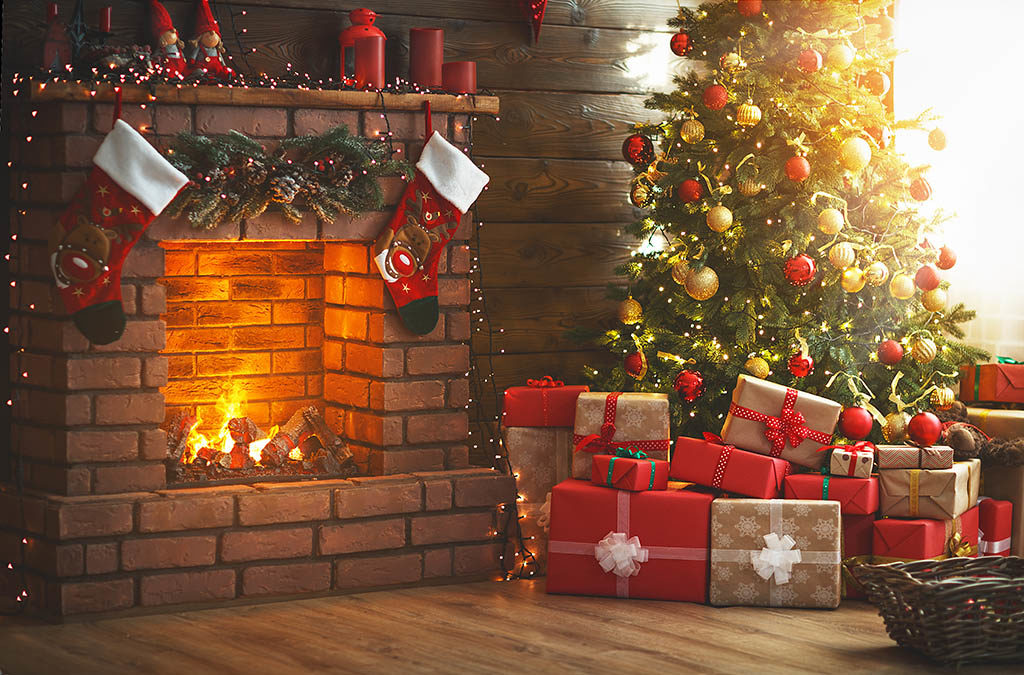
Your Fireplace Could be Increasing Your Energy Bill
If you are like many people who look forward to the months of winter, you likely use a fireplace to keep your home warm while the snow (okay, not in Venice, Florida) is falling outside. Sitting by the fire and drinking hot chocolate on a cold day is one of the simple pleasures in life, but homeowners often use fireplaces to save money on their heating bills, which makes sense from the surface. While correctly utilizing a fireplace can work wonders to reduce your energy consumption, making mistakes can increase your heating expenses more than you might think, and most people are not aware of the threat.
Close the Damper When You Don't Have a Fire
Knowing how your damper works is a good place from which to start when your goal is to avoid wasting energy. The damper in your fireplace allows you to increase or decrease the fire's intensity by making adjustments. It's a metal plate in your chimney that you control with a little valve, and you can open or close it without much trouble.
When you have a fire burning in your fireplace and want to enjoy the best results, keeping the damper open also enables the smoke to escape so that it won't leak back into your home. But when you don't have a fire, leaving your damper open is a waste of money, allowing the warm air from your home to flow outside.
Install Doors on Your Fireplace
Even if you use your damper to prevent warm air from getting outside, you will also want another layer of protection. You will need to have a door on your fireplace to create a seal that will prevent you from wasting energy. If your fireplace does not already have a door, getting one installed is a worthy investment that you don't want to overlook. The right door will go a long way when it comes to reducing your monthly expenses, saving you money over the long run.
The doors that you buy must fit if you want to get the most from your purchase. Reminding other people who live in your home to keep the doors shut is vital when you want to keep your spending under control, and you will know that you have done the right thing.
Seal Your Doors and Windows
Even though using a fireplace will heat your home and keep it warm, most of the heat is lost through the chimney. Depending on the type of fireplace you have, you might lose up to 90 percent of your heat, but you can try a few things to combat the problem.
Knowing how the air in your home flows and the role the fireplace plays will keep you on track. As the warm air escapes through the chimney, the air from the other parts of your home will rush in to replace it. Small cracks in your doors and windows will allow the cold air from outside to enter your home and lower the temperature, and you will want to prevent that from happening.
You can stop fireplace leaking air conditioning by sealing the cracks under your doors and windows with a weatherproof solution. You might not know if air is coming in from outside, but you can conduct a simple test. Place the back of your hand under each door and window in your home to get an answer. If you feel cold air hitting your hand, you have an issue that you need to address. Although it might not seem like much, this step can provide you with impressive results right away, and you will keep a little more money in your wallet each month.
Contacting an HVAC Expert
Although you can take several steps to reduce fireplace leaking air conditioning, you can't compete with the training and experience of a heating, ventilating, and air conditioning expert. You can hire an HVAC expert to search your home and fireplace for signs of energy loss that you can repair to increase your home's energy efficiency.
A talented expert will give you advice on how to get the most from your fireplace and HVAC system so that you won't need to worry about throwing money away. Your HVAC professional will ensure that your doors and windows are sealed and that you don't have issues with your vents. When you consider how much you can save by making a few corrections, you can see why enlisting an HVAC expert is an investment that you don't want to overlook. Call or Text us today for more details (941) 203-7955 and don't forget to check out our specials.
How Much of your electric bill is the air conditioner?
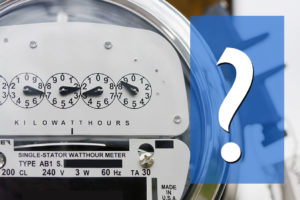
While summer is the hottest time of year, in Florida you will likely need to run your AC even during the winter months to get some relief from the heat and humidity. Air conditioning keeps you cool, helps you to avoid heat stroke, and overall create a more comfortable environment to complete your daily tasks. The cost of heating and cooling is something that is a concern because the average household spent almost 50 percent of their energy bill on cooling costs during the summer months in 2009. It’s beneficial to understand how much your air conditioner energy use will affect your electric bill.
Size of the air conditioner
The size of your air conditioner is the primary factor to consider when calculating your electric costs. Air conditioners are sold in small, medium, large, and extra-large rooms. British Thermal Units (BTUs) is how air conditioners are measured and based on how much square footage they’re designed to cool effectively. A small air unit designed to cool up to 150 square feet is 5,000-6,000 BTUs, while a larger one made to cool 450 square feet averages 10,000 BTU. They can be purchased in BTUs up to 24,000 for rooms up to 1,560 square feet. A larger unit is ideal if you have an open floor plan that allows the air to circulate between rooms.
Other factors
The size of the room isn’t the only thing you need to consider. Factors such as excessive sunlight, rooms that hold more people, and the kitchen benefit from having a unit with a larger BTU. The outside temperature is something else to keep in mind because it will take more energy and runtime to drop the inside temperature to a comfortable level. Well-insulated rooms cool easier and require less electricity, while a room with poor insulation is going to increase your bill a bit more. Check the energy efficiency rating for each unit. The majority of units comply with Energy Star standards to conserve on usage. They use up to 14 percent less energy than the government requirements to qualify for the rating, and in some cases qualify for a tax credit.
Reducing costs
Keep your costs lower by taking additional steps to reduce consumption. Ensure that your unit is adequately rated to cool the room you’re installing it in. A 5,000 BTU air conditioner will not cool a room that is 1,000 square feet. It will need to work at maximum capacity and still be ineffective at cooling down the room temperature. Most units are programmable and allow you to set the temperature while you’re in bed or at work to cut costs. Draw the blinds during the day to keep the sun out and open windows at night to let cool breezes in, instead of running your air conditioner all night long while you’re sleeping. You can even set them to turn on shortly before you get home to cool the house down before you get in the door.
Calculation
A small 6,500 BTU air conditioner will use about 144 kWh running for six hours a day, while a larger 12,000 BTU unit running for six hours every day will use about 270 kWh per month. These are estimates and the settings on your unit and the other factors that impact usage will impact your average consumption. If you’re home all day or need to run your air conditioner at night to be comfortable, your air conditioner energy use will be higher. It's going to fluctuate from month to month depending on how the price for each kWh is on your bill.
Your electric costs also depend on where in the country you live in. Some states have lower rates than others, and they fluctuate from month to month making it difficult to estimate exactly how much running your air conditioner will cost you from one month to the next. Utilize these tips to cool your house down while keeping your costs low. Call or Text us today for more details (941) 203-7955 and don't forget to check out our specials, financing, and rent-to-own options.
Lower Air Conditioning Bills for Your Business
As any business owner is aware, a large cost of maintaining a welcoming environment for employees and customers is making sure that the environment is comfortable--not too hot and not too cold. For most business owners, this means simply eating the cost of high electric bills.

However, there are ways that you can save money and still maintain good indoor air quality throughout your business, many of these are very low cost and can be immediately introduced the same day. Simple things like making sure doors and windows have proper weatherstripping and are kept closed when not being used can end up saving you hundreds of dollars over the course of a year; Many people do not make sure that there is not air leaking around the bottom of doors and windows, or they underestimate the problems (aside from loss of money, air gaps can cause too much humidity which leads to mold, or even pest infestations within a building, particularly if the business is a food based one) and money loss it is causing. Weatherstripping is low cost and can be installed the same day, even by people who do not have any prior experience in doing so.
Now that we have talked about how to use physical barriers to reduce air, we can look at more involved ways to lower AC bills, all the while keeping your business cool and warm enough.
1.Replace Old AC Units
While this is obviously a significant monetary investment, the benefits of purchasing a new unit will by far outweigh the cost; While it is possible, of course, to repair an AC unit, it is often very expensive and will likely not significantly extend the life of a unit that is simply worn out. As an additional benefit, units labeled "Energy Star" can use up to 50% less energy than regular models, saving you even more money.
2. Get a Programmable Thermostat
While this may seem like a no brainer, there are still people who do not have thermostats that can be set on a timer so that less heating/cooling energy will be used when the business is not open. With a programmable thermostat, you can not only set a time schedule for when you use your cooling unit, with many models you can also set individual temperatures for each room according to individual preferences or needs.
3. Remember to Regularly Replace Air Filters
This is another common money saving tip that is often neglected both by home and business owners. An old air filter is an air filter that not only is not performing adequately which means your units will be running more often, costing you money, but it also means that allergens are likely being introduced into the atmosphere.
4. Make Sure your HVAC Unit is not Obstructed
This means that you should keep your unit away from potentially dangerous shrubbery, trees, or other building structures which could potentially damage or ruin it. Remember, your unit will provide you with many years of service if you take care of it.
5. Make Sure your Vents are Open
Some people like to keep certain vents closed because they do not want as much air blowing in that area, etc. This is really not a good idea if it can be avoided--and being able to control the temperature with a programmable thermostat may take the place of closing a vent. Obstructing air flow can shorted the life of your unit, and in some cases, cause overheating or other electrical issues that could potentially be dangerous. Also, heat rises, so running ceiling fan(s) can be another low cost way to keep an area cooler without turning the AC cooler.
As you can see, there are many ways you can both save money and improve the quality of the air in your business and home. If you have questions or are still dealing with high bills after integrating some of these ideas, contact an HVAC professional who can inspect your business or home and give you an estimate of what can be done to improve the quality of your environment.
World Leaders Agree to Use Safer AC Coolant- But You Do Not Have to Wait
The Latest International Climate Agreement Means Better Air Conditioner Performance For Everyone
Warnings about a warming earth continue to be a hot topic among politicians, scientists and business leaders world-wide. There is a consensus that a trend in global warming is for real. The dispute remains as to the cause: is it man-made or a cyclical and naturally occurring event that we have no control over. And now refrigerant's like the ones in old air conditioners or refrigerators are front and center as a big part of the problem - and solution.

Recently, representatives from more than 100 countries joined the U.S. administration in backing an ambitious worldwide agreement the phase out Hydrofluorocarbons (HFC) as refrigerants in air conditioning systems.
What was thought to be a solution to the dangerous depletion of the ozone layer thirty years ago, the HFC coolants have now been deemed a problem.
Hydrofluorocarbons seemed like a remedy to an environmental crisis targeted in 1980s. The reduction of the earth’s ozone layer was theorized to be caused from chemical emissions of refrigerants used in air conditioning and refrigeration around the world.
The new HFC compounds could do everything the old ones could without damaging the ozone layer, so global policymakers turned to them as a substitute. In 1987, this swap of refrigerants was formalized in the Montreal Protocol on Substances that Deplete the Ozone Layer.
The change appeared to have worked. The ozone layer, our greatest protection from the harmful rays of the sun, has recovered dramatically and to its normal configuration. During the past thirty years, however, the overall problem of temperature warming and climate change has worsened dramatically. Some of this climate deterioration is blamed on hydrofluorocarbons.
Now, world leaders strongly support an amendment to the Montreal Protocol aimed at cutting hydrofluorocarbons (HFCs) and replacing it with a more environmentally friendly ac coolant.
HFCs is a far less common gas than the most abundant greenhouse gas carbon dioxide. But HFCs have a much higher (20 times) warming potential than carbon dioxide by volume, making it more destructive.
The declaration stated that by passing the Montreal Protocol to phase down HFCs, we could reduce global warming by up to 0.5°C by the end of the century. The agreement, known as the Kigali Amendment to the Montreal Protocol, will be one of the most effective contributors to reaching goals described in the Paris climate accord that becomes a legal at the end of November.
The changeover will take time, however. The U.S. and some other developed countries nations will begin to phase out HFCs in the year 2019. An additional 100 developing nations, including China and Brazil, will begin to reduce their emissions in 2024. India and Pakistan and Persian Gulf states will not start until 2028.
The long-range goal is to for every country to have achieved an 80% reduction in HFCs by 2040.
The Obama administration has already begun to encourage our military and other government departments to purchase equipment that will run on climate-helpful alternatives coolants where feasible.
The American consumer doesn’t have to wait for the safer coolant mandate to kick in, however.
To avoid the use of hydrofluorocarbons (HFCs), a variety of climate-friendly, efficient and safe alternatives are available today. Hydrocarbon refrigerants have been used for many years in refrigerators and freezers in people`s homes throughout the world. Over 90% of new appliances nowadays contain hydrocarbon refrigerants, including the complete line of air conditioners and heat pumps from Bryant . These appliances are very efficient also under high-ambient temperatures.
A hydrocarbon [HC] is an elementary compound of hydrogen and carbon which occurs naturally. It’s found in large concentrations in crude oil. Used as a modern refrigerant, non-toxic hydrocarbons are an eco¬friendly alternative to fluorocarbons.
The next time you are serviced by an HVAC company like the MAHLE Cool Air, ask about having your old coolant replaced with Puron from Bryant. It is an environmentally friendly ac coolant that doesn't contain HFCs and offers far superior performance that the older coolants.
